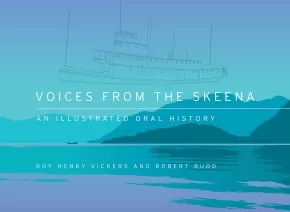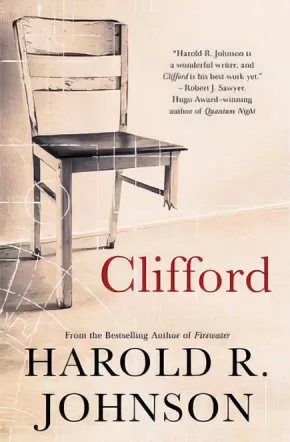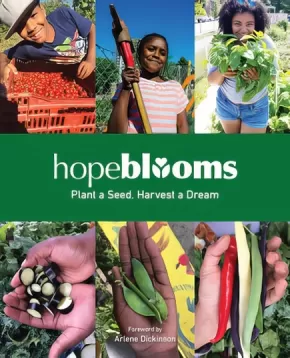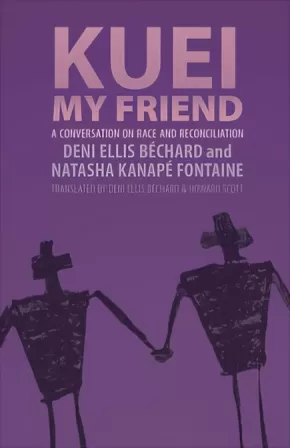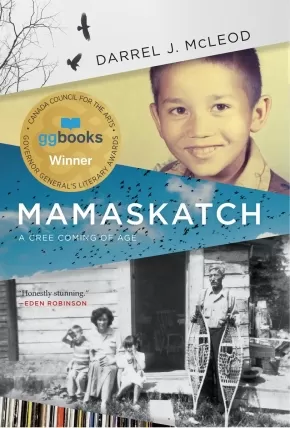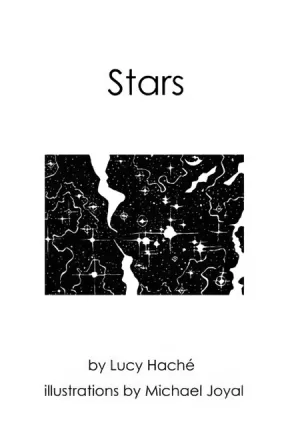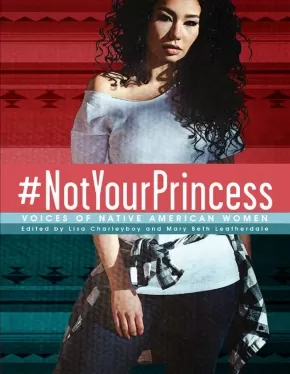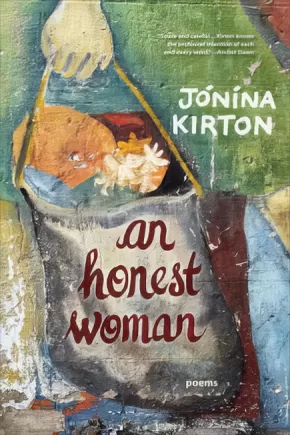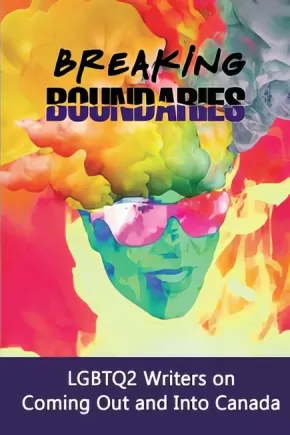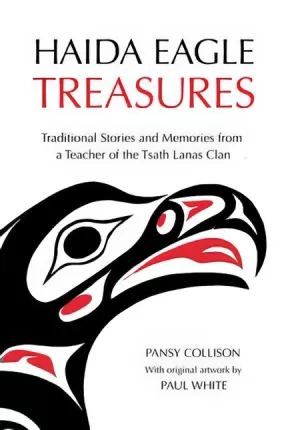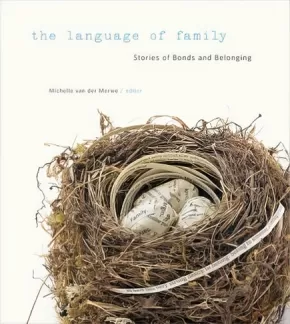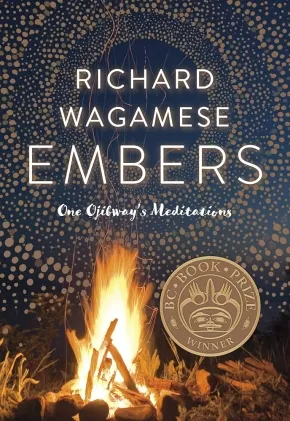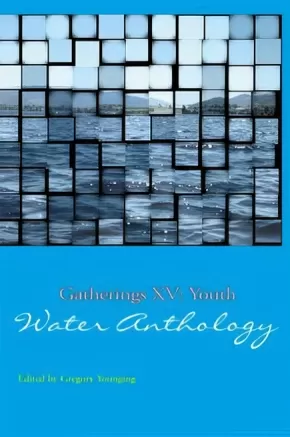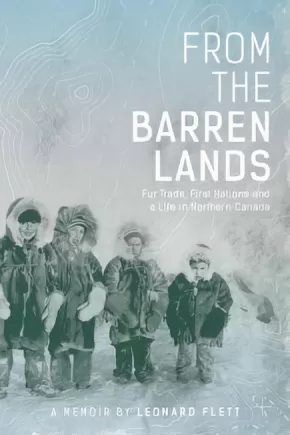
Personal Narratives
61
-
75
of
84 Results;
Sort By
Go To
of 6
Voices from the Skeena: An Illustrated Oral History
$36.95
Format:
Hardcover
Text Content Territories:
Indigenous Canadian; First Nations; Gitxsan (Gitksan); Tsimshian (Ts'msysen);
ISBN / Barcode: 9781550178838
Synopsis:
Synopsis:
The Skeena, second longest river in the province, remains an icon of British Columbia’s northwest. Called Xsien (“water of the clouds”) by the Tsimshian and Gitksan, it has always played a vital role in the lives of Indigenous people of the region. Since the 1800s, it has also become home to gold seekers, traders, salmon fishers and other settlers who were drawn by the area’s beauty and abundant natural resources.
Voices from the Skeena takes readers on a journey inspired directly by the people who lived there. Combining forty illustrations with text selected from the pioneer interviews CBC radio producer Imbert Orchard recorded in the 1960s, the book follows the arrival of the Europeans and the introduction of the fur trade to the Omineca gold rush and the building of the Grand Trunk Pacific Railroad.
Open the pages to meet Robert Cunningham, an Anglican missionary who would later become the founder of the thriving Port Essington. Here too is a man called Cataline, a packer for whom no settlement was too remote to reach, and the indominable Sarah Glassey, the first woman to pre-empt land in British Columbia. At the heart of these stories is the river, weaving together a narrative of a people and their culture. Pairing the stories with Roy Henry Vicker’s vibrant art creates a unique and captivating portrait of British Columbia that will appeal to art lovers and history readers alike.
Additional Information
112 pages | 11.00" x 8.00" | 40 colour illustrations
This work has received the Authentic Indigenous Text label because of the interviews/contributions with Indigenous people like Vicky Sims and Chief Jeffrey H. Johnson. It is up to readers to determine if this work is authentic for their purposes.
Clifford: A Memoir, A Fiction, A Fantasy, A Thought Experiment
$22.95
Format:
Paperback
Text Content Territories:
Indigenous Canadian; First Nations; Cree (Nehiyawak);
Grade Levels: 12; University/College;
ISBN / Barcode: 9781487004101
Synopsis:
Synopsis:
I open my eyes in the darkness, laying on my side, half my vision is of the earth and shadows; the other is of the sky, treetops, and stars. I should write Clifford’s story. The thought emerges fully formed . . . The thought dissipates. I close my eyes and the earth and the sky disappear. The warmth of my sleeping bag wraps around me and sleep pulls me under into that half-world where reality and fantasy mingle in a place where coherent thoughts disintegrate.
When Harold Johnson returns to his childhood home in a northern Saskatchewan Indigenous community for his brother Clifford’s funeral, the first thing his eyes fall on is a chair. It stands on three legs, the fourth broken off and missing. So begins a journey through the past, a retrieval of recollections that have too long sat dormant. Moving from the old family home to the log cabin, the garden, and finally settling deep in the forest surrounding the property, his mind circles back, shifting in time and space, weaving in and out of memories of his silent, powerful Swedish father; his formidable Cree mother, an expert trapper and a source of great strength; and his brother Clifford, a precocious young boy who is drawn to the mysterious workings of the universe.
As the night unfolds, memories of Clifford surface in Harold’s mind’s eye: teaching his younger brother how to tie his shoelaces; jousting on a bicycle without rubber wheels; building a motorcycle. Memory, fiction, and fantasy collide, and Clifford comes to life as the scientist he was meant to be, culminating in his discovery of the Grand Unified Theory.
Exquisitely crafted, funny, visionary, and wholly moving, Clifford is an extraordinary work for the way it defies strict category and embraces myriad forms of storytelling. To read it is to be immersed in a home, a family, a community, the wider world, the entire cosmos.
Reviews
“Clifford is a luminous, genre-bending memoir. Heartache and hardship are no match for the disarming whimsy, the layered storytelling shot through with love. The power of land, the pull of family, the turbulence of poverty are threads woven together with explorations of reality, tackling truth with a trickster slant.” — Eden Robinson, author of Son of a Trickster
“Clifford is a story only Harold Johnson could tell. By turns soft and harsh, intellectual and emotional, Johnson weaves truth, fiction, science, and science fiction into a tapestry that is rich with meaning and maybes. A natural storyteller, Johnson seeks imagined pasts and futurity with equal parts longing and care. This work allows readers and writers the possibility of new and ancient modes of storytelling.” — Tracey Lindberg, author of Birdie
“Harold R. Johnson is a wonderful writer, and Clifford is his best work yet. For fans of Jack Finney and Richard Matheson, this terrific book is a wonderfully human tale of memory both bitter and sweet, as well as a poignant exploration of time’s hold over all of us.” — Robert J. Sawyer, Hugo Award–winning author of Quantum Night
“Clifford is unlike anything I’ve read — it is at once a story of science and magic, love and loss, and a case for the infinite potential of humanity. It is a book of profound wisdom — an unpacking of the deepest truths of science in an effort to transform the pain of grief and regret into healing and forgiveness.” — Patti Laboucane-Benson, author of The Outside Circle
Educator Information
Curriculum Connections: English, Biographies, Family
Additional Information
264 pages | 5.25" x 8.00"
Hope Blooms: Plant a Seed, Harvest a Dream (3 in Stock)
$24.95
Format:
Paperback
ISBN / Barcode: 9781771086950
Synopsis:
Synopsis:
There is an old saying that it takes a village to raise a child, but Jessie Jollymore has experienced through the youth of Hope Blooms, an inner-city initiative she founded that engages at-risk youth, that sometimes it takes the children to raise the village. A dietitian who worked in inner city health for 15 years, Jollymore witnessed the challenges people face every day with food security, isolation, discrimination, and poverty. An idea bloomed of creating sustainable, youth-driven micro-economies: growing local food systems, growing social enterprises, and mentoring youth to become leaders of change. This led to over 50 youth ages 6 to 18 leading the way in growing over 3,000 pounds of organic produce yearly for their community, building innovative outdoor classrooms, and building a successful Fresh Herb Dressing social enterprise, with 100% of proceeds going toward growing food, and scholarships for youth.
In this inspiring, vibrant book, the youth behind Hope Blooms tell the story of the social enterprise they built from the soil up, the struggles of "creating something from nothing," successfully navigating the world of business, and ultimately building resilience and leaving behind a legacy. Includes youth's words of wisdom, stories, and poetry, and over 75 colour photos.
Additional Information
180 pages | 7.50" x 9.25"
Kuei, My Friend: A Conversation on Race and Reconciliation
$19.95
Format:
Paperback
Text Content Territories:
Indigenous Canadian; First Nations; Innu (Montagnais-Naskapi);
ISBN / Barcode: 9781772011951
Synopsis:
Synopsis:
Kuei, My Friend is an engaging book of letters: a literary and political encounter between Innu poet Natasha Kanapé Fontaine and Québécois-American novelist Deni Ellis Béchard. Choosing the epistolary form, they decided to engage together in a frank conversation about racism and reconciliation.
Intentionally positioned within the contexts of the Idle No More movement, Canada’s Truth and Reconciliation Commission, and the National Inquiry into Missing or Murdered Aboriginal Women and Girls, the letters in Kuei, My Friend pose questions in a reciprocal manner: how can we coexist if our common history involves collective and personal episodes of shame, injury, and anger? how can we counteract misunderstandings of the Other, which so often lead to contempt and rejection? how can we educate non-Indigenous communities about the impact of cultural genocide on the First Peoples and the invisible privileges resulting from historical modes of domination?
In an attempt to open a sincere and productive dialogue, Kanapé Fontaine and Ellis Béchard use their personal stories to understand words and behaviours that are racist or that result from racism. With the affection and intimacy of a friend writing to a friend, Natasha recounts to her addressee her discovery of the residential schools, her obsession with the Oka Crisis of 1990, and her life on the Pessamit reserve. Reciprocating, Deni talks about his father’s racism, the segregation of African-Americans and civil rights, and his identity as a Québécois living in the English-speaking world.
By sharing honestly even their most painful memories, these two writers offer an accessible, humanist book on the social bridge-building and respect for difference. Kuei, My Friend is accompanied by a chronology of events, a glossary of relevant terms in the Innu language, and, most importantly, a detailed teacher’s guide that includes topics of discussion, questions, and suggested reflections for examination in a classroom setting.
Educator Information
Recommended resource for Grades 10-12 in these areas: BC First Peoples, Contemporary Indigenous Studies, English First Peoples, English Studies, Literary Studies.
Includes an Innu-aimun glossary and a teacher's guide to help classroom discussion facilitation.
Recommended in the Canadian Indigenous Books for Schools 2019-2020 resource list as being useful for grades 10 to 12 for English Language Arts and Social Studies.
This resource is also available in French: Kuei, je te salue: Conversation sur le racisme.
Additional Information
176 pages | 6.21" x 8.46" | Translated by & Deni Ellis Béchard & Howard Scott
Mamaskatch: A Cree Coming of Age (HC) (1 in Stock)
$29.95
Format:
Hardcover
Text Content Territories:
Indigenous Canadian; First Nations; Cree (Nehiyawak);
Grade Levels: 12; University/College;
ISBN / Barcode: 9781771622004
Synopsis:
Synopsis:
A powerful story of resilience—a must-read for all Canadians.
Growing up in the tiny village of Smith, Alberta, Darrel J. McLeod was surrounded by his Cree family’s history. In shifting and unpredictable stories, his mother, Bertha, shared narratives of their culture, their family and the cruelty that she and her sisters endured in residential school. McLeod was comforted by her presence and that of his many siblings and cousins, the smells of moose stew and wild peppermint tea, and his deep love of the landscape. Bertha taught him to be fiercely proud of his heritage and to listen to the birds that would return to watch over and guide him at key junctures of his life.
However, in a spiral of events, Darrel’s mother turned wild and unstable, and their home life became chaotic. Sweet and innocent by nature, Darrel struggled to maintain his grades and pursue an interest in music while changing homes many times, witnessing violence, caring for his younger siblings and suffering abuse at the hands of his surrogate father. Meanwhile, his sibling’s gender transition provoked Darrel to deeply question his own sexual identity.
The fractured narrative of Mamaskatch mirrors Bertha’s attempts to reckon with the trauma and abuse she faced in her own life, and captures an intensely moving portrait of a family of strong personalities, deep ties and the shared history that both binds and haunts them.
Beautifully written, honest and thought-provoking, Mamaskatch—named for the Cree word used as a response to dreams shared—is ultimately an uplifting account of overcoming personal and societal obstacles. In spite of the traumas of Darrel’s childhood, deep and mysterious forces handed down by his mother helped him survive and thrive: her love and strength stayed with him to build the foundation of what would come to be a very fulfilling and adventurous life.
Reviews
“Honestly stunning. McLeod’s clear writing lays bare his complicated ties to his family, his lovers and his country in a memoir that moved and haunted me. If you loved Maria Campbell’s Halfbreed, you will love Mamaskatch.” — Eden Robinson, author of Son of a Trickster and Monkey Beach
“Reading the text was like diving into the eternity of dreams and being paralyzed by a nightmare. However, there is sunrise. Told candidly and with heartbreaking honesty, McLeod’s memoir shows how survival beckoned and he held on to the spirit of his ancestors—the love that no one can ever sever. He lives for all of us. — Louise Bernice Halfe, author of Burning in this Midnight Dream
“A compelling read that shows the heartbreaking results of imposed oppression. Darrel has identity problems of many kinds and the result is a life full of chaos. The gradual climb out of that dark place is touching.” — Bev Sellars, former councillor and chief of the Xat’sull First Nation and author of Price Paid.
“Mamaskatch is a profound and tender love song, an elegy to a wounded family, and an unsparing, exquisitely moving chronicle of growing up “Nehiyaw” (Cree). Like the birdsong his mother taught him to understand, McLeod’s voice is magical; it will lift and carry you through bone-breaking grief with grit, optimism and wry, life-saving humour. You will not leave this book unchanged.” — Denise Ryan, journalist, Vancouver Sun
"Darrel McLeod’s Mamaskatch is a heart-wrenching mîwâsin memoir full of vignettes that are so intricately woven that they guide you through with grace, sâkihiwêwin, humour, and maskihkîy. This is a narrative built through continuums that detail the lives of the McLeod family through their queer travails, trans realities, bannock and stew conversations, and a plethora of intergenerational traumas and triumphs. I can feel the warm embrace of the Three Sisters wrapping around me as I read this, that heart-drum beat resounding beneath its literary cadences, the frigidity of the Athabasca kissing my heels, and a narrator who teaches me from his very first passage in this novel that a good story is a medicine song that re-members and re-animates, in true nehiyawewin fashion, those who have paved the way for us and those who for whom we pave. Ay-hay, Darrel, for this lovely work that lulls me back into those old-fashioned country songs that nearly every prairie kokôm raised us on. Mâmaskâc!" — Joshua Whitehead, author of Full-Metal Indigiqueer and Jonny Appleseed
Additional Information
240 pages | 6.00" x 9.00"
Stars
$19.95
Artists:
Format:
Paperback
Text Content Territories:
Indigenous Canadian; First Nations; Kwakwaka'wakw (Kwakiutl);
ISBN / Barcode: 9781988168104
Synopsis:
Synopsis:
In this second installation of the Overhead Series, Lucy Haché once again transports the reader with intimate revelations on identity by exploring both her personal and ancestral relationship to the sky and stars. Hache's prose is extraordinary in its combination of self-awareness yet unselfconscious honesty and skillful restraint, creating a sense of connection under the vastness of the stars above. Masterfully illustrated by artist Michael Joyal, his evocative astronomic drawings contribute to the overall sensory and transcendent experience.
Reviews
"[Hache] uses the stars to remember not only the tribulations of the past - Residential Schools and the loss of her traditional village - but also to remember the happiness of her grandmothers and to remember her language. Her poetic prose if full of imagery so rich that the reader can feel swept away with the power of the language." - Canadian Indigenous Books for Schools 2018-2019
"Indigenous People have always had a strong relationship with the sky. Here, Joyal's stark, beautiful illustrations combine perfectly with Haché's voice as she sings a story of loss, and ultimately, reclamation." --David A. Robertson, author of When We Were Alone (winner 2017 Governor General's Literary Award) and Strangers
Educator & Series Information
Recommended resource for Grades 8-12 for these subject areas: English Language Arts.
A Kwak'wala language glossary is found at the back of the book.
This book is part of the Overhead Series.
Additional Information
80 pages | 5.50" x 8.50"
#NotYourPrincess
$14.95
Editors:
Format:
Paperback
Text Content Territories:
Indigenous;
ISBN / Barcode: 9781554519576
Synopsis:
Synopsis:
Native women demand to be heard in this stunning anthology.
Whether looking back to a troubled past or welcoming a hopeful future, the powerful voices of Indigenous girls and women across North America resound in this book. In the same visual style as the bestselling Dreaming in Indian, #NotYourPrincess presents an eclectic collection of poems, essays, interviews, and art that combine to express the experience of being a Native woman. Stories of abuse, intergenerational trauma, and stereotyping are countered by the voices of passionate women demanding change and realizing their dreams. Sometimes outraged, often reflective, but always strong, the women in this book will give teen readers insight into the lives of women who, for so long, have had their history hidden and whose modern lives have been virtually invisible.
Reviews
“A stunning anthology of creative writing and art . . . All YA collections will want this."— Alicia Abdul, School Library Journal
Educator Information
Themes: First Nations; Native Peoples; Indigenous; girls and women; biography; multicultural; stereotyping; acceptance; community; prejudice; self-esteem; tolerance
Interest Age 14+ | Grade 9+
The Canadian Indigenous Books for Schools list recommends this resource for Grades 8-12 for these subjects: English Language Arts, Social Justice, Social Studies.
Additional Information
8.5 x 11 | 112 Pages
An Honest Woman
$16.95
Format:
Paperback
Text Content Territories:
Indigenous Canadian;
ISBN / Barcode: 9781772011449
Synopsis:
Synopsis:
An Honest Woman by Jonina Kirton confronts us with beauty and ugliness in the wholesome riot that is sex, love, and marriage. From the perspective of a mixed-race woman, Kirton engages with Simone de Beauvoir and Donald Trump to unravel the norms of femininity and sexuality that continue to adhere today.
Kirton recalls her own upbringing, during which she was told to find a good husband who would “make an honest woman” out of her. Exploring the lives of many women, including her mother, her contemporaries, and well-known sex-crime stories such as the case of Elisabeth Fritzl, Kirton mines the personal to loosen the grip of patriarchal and colonial impositions.
An Honest Woman explores the many ways the female body is shaped by questions that have been too political to ask: What happens when a woman decides to take her sexuality into her own hands, dismissing cultural norms and the expectations of her parents? How is a young woman’s sexuality influenced when she is perceived as an “exotic” other? Can a woman reconnect with her Indigenous community by choosing Indigenous lovers?
Daring and tender in their honesty and wisdom, these poems challenge the perception of women’s bodies as glamorous and marketable commodities and imagine an embodied female experience that accommodates the role of creativity and a nurturing relationship with the land.
Reviews
“Jonina Kirton is courageously honest about her life experiences as a female of Indigenous and immigrant ancestry. Many poems resonate deeply, as we identify with her personal quest to figure out who she is, and the unacceptable things done to her. Her raw honesty is unsettling and uncomfortable, because it can be our truth too. Her poems depict devaluation and dehumanization, grieving, lessons learned. Her poems offer important insights as to why there are thousands of missing and murdered Indigenous women.” — Senator Lillian E. Dyck
“When writing from the voice of between, writer and reader have no place to hide. Assumptions and camouflage fall away. Murdered, missing, and violated women and girl voices have been silenced. The story lethally repeats. Kirton picks over how she was raised familially and culturally like a crime scene. Too, she affirms, ‘I have been here forever and I will rise again and again.’ Tough, eloquent, revelatory, these poems are the very ones we are desperately in need of.” — Betsy Warland, author of Oscar of Between: A Memoir of Identity and Ideas
“I’m sure people have been looking at me strangely every time I gasp, but I can’t glance away from the page for even a second to notice. Some of the poems end sharply, with a punch; some deliberately leave me searching for the next line; others show the repetition of heartbreaking cycles of violence and oppression, but offer a portrayal of resilience, too.” — All Lit Up!
Educator Information
This book would be useful for Women's Studies, Creative Writing, English Language Arts, Poetry, and English courses. Recommended for grades 11-12 and university-college students.
Please be advised, this book contains explicit sexual references and references to sexual and physical abuse.
Additional Information
104 pages | 6.00" x 9.00"
Breaking Boundaries: LGBTQ2 Writers on Coming Out and Into Canada
$13.95
Editors:
Format:
Paperback
ISBN / Barcode: 9780994730275
Synopsis:
Synopsis:
An anthology of stories and poetry written by Canadian LGBTQ2 authors who are immigrants, refugees, or Canada-born.
“What does it mean to be LGBTQ2 in Canada? The only possible answer to that question is one given in many voices. That is exactly what this book offers. There is struggle in these stories and poems, but there is also strength and resilience, compassion and determination. Woven together these voices leave me with a sense of hopefulness: a belief that the creativity and fierce commitment of our community will carry us forward as we work to create a Canada that lives up to the dream of freedom and safety it represents to so many people around the world.” — Robin Stevenson, author of Pride: Celebrating Diversity and Community
Review
The anthology pieces are diverse with authors who identify as Lesbian, Gay, Bisexual, Transgender and 2-Spirited. It also includes stunning artwork by LGBTQ artists and allies. — Rainbow Refugee Society
Authors & Artists
Authors in this anthology include Teryl Berg, Kyle Chen, Wendy Judith Cutler, Corrie Hope Furst, Kevin Henry, Anne Hofland, Chantal Hughes, Masaki Kidokoro, Dale Lee Kwong, Austin Lee, JL Lori, Eka Nasution (narrator), Adam Nixon, Rainer Oktovianus (narrator), Gail Marlene Schwartz, Caelan Sinclair, LS Stone, Sosania Tomlinson, E.T. Turner, and Hayley Zacks.
Artwork by Joni Danielson, Wokie Clark Fraser, Austin Lee, Trinity Lindenau, and Rainer Oktovianus.
Additional Information
146 pages | 6.00" x 9.00"
Edited by Lori Shwydky
This book contains memoirs, stories, poems, and artwork, which is why it appears in a variety of categories, such as both Fiction and Non-fiction, on our website.
Haida Eagle Treasures: Traditional Stories and Memories from a Teacher of the Tsath Lanas Clan
$24.95
Artists:
Format:
Paperback
Text Content Territories:
Indigenous Canadian; First Nations; Haida; Eagle Clan (Ts'aahl);
ISBN / Barcode: 9781550597486
Synopsis:
Synopsis:
Take a journey into the heart of Haida culture as it is lived and experienced by an extraordinary woman of the Tsath Lanas Eagle Clan. Pansy Collison, a Haida woman born and raised in Old Massett on Haida Gwaii, tells stories of her clan and community, as well as personal narratives about her history and family. Haida Eagle Treasures embodies a strong Haida woman’s voice, offering a rare glimpse inside Haida culture. Each story and memory is a treasure that captures part of the beauty of the Haida worldview and way of life.
Now retired, Pansy taught for 23 years at elementary, secondary, and college levels. From these experiences, she describes some of the challenges and contradictions of living between two worlds. Pansy’s teaching skills, artistic talents, and political affiliations keep her involved in politics and education on Haida Gwaii.
Thirteen original illustrations by Pansy’s brother, Paul White, a gifted artist, teacher, pole carver and designer, provide the guideposts within Haida Eagle Treasures.
Educator Information
Recommended in the Canadian Indigenous Books for Schools 2019-2020 resource list as being useful for grades 8-12 for English Language Arts and Social Studies.
Caution: use of the term "Native" throughout.
Additional Information
244 pages | 6.00" x 9.00" | 2nd Edition
Little Athapapuskow: A Métis Love Story (4 in stock, Out of Print)
$20.00
Artists:
Format:
Paperback
Text Content Territories:
Indigenous Canadian; Métis;
ISBN / Barcode: 9781926795829
Synopsis:
Synopsis:
Little Athapapuskow is collection of poems named after a lake Guy Freedman grew up on near Flin Flon, Manitoba. They represent his efforts to challenge Catholicism and its complicity with the Confederation project, which dismantled the New Nation developing in the Canadian Northwest. The poems are organized into three parts—past, present, and future—and they address the inter-generational impacts of the Church on his family in relation to the doctrine of the Holy Trinity. This book is his love song to his home and to his country.
Educator Information
Recommended resource for Grades 10-12 English Language Arts and Social Studies.
Contains poems about the history of the Métis people, family, love, celebration of culture, colonialism, religion, violence.
Caution: Some poems contain strong language and mature subject matter, such as discussions of violence, alcoholism, and sexuality.
Additional Information
86 pages | 7.25" x 5.75 "
The Language of Family: Stories of Bonds and Belonging
$24.95
Editors:
Format:
Paperback
Text Content Territories:
Indigenous Canadian; First Nations;
ISBN / Barcode: 9780772670526
Synopsis:
Synopsis:
What is family? Is it defined by blood and birth? Or can we invite whomever we want into that intimate embrace?
The Language of Family: Stories of Bonds and Belonging invites readers to pull up a guest chair at the family table.
Twenty contributors from across British Columbia -- museum curators, cultural luminaries, writers and thinkers young and old, from First Nations, LGBTQ, Japanese Canadian and Punjabi communities, among others -- share their vastly different perspectives on what family means in this superb collection of personal narratives, poems and essays.
This collection will provoke, tease, enlighten and infuriate. Isn't that what family does best?
Stories, poems and essays by Sadhu Binning, Martha Black, Don Bourdon, Kathryn Bridge, Tzu-I Chung, Shushma Datt, Mo Dhaliwal, Zoé Duhaime, barbara findlay, Lynn Greenhough, Judith I. Guichon, Lorne F. Hammond, Joy Kogawa, Patrick Lane, Jack Lohman, Luke Marston, Bev Sellars, Monique Gray Smith, Ann-Bernice Thomas and Larry Wong.
Educator Information
Some Indigenous content.
Additional Information
250 pages | 8.50" x 9.49"
Authenticity Note: This book contains contributions from Indigenous writers, which is why it has received the Authentic Indigenous Text label. There are, however, many other contributors who are not Indigenous whose works are also included.
Embers: One Ojibway's Meditations
$21.95
Format:
Paperback
Text Content Territories:
Indigenous Canadian; First Nations; Anishinaabeg; Ojibway; Wabaseemoong First Nation;
Grade Levels: 12; University/College;
ISBN / Barcode: 9781771621335
Synopsis:
Synopsis:
"Life sometimes is hard. There are challenges. There are difficulties. There is pain. As a younger man I sought to avoid them and only ever caused myself more of the same. These days I choose to face life head on--and I have become a comet. I arc across the sky of my life and the harder times are the friction that lets the worn and tired bits drop away. It's a good way to travel; eventually, I will wear away all resistance until all there is left of me is light. I can live towards that end." - Richard Wagamese, Embers
In this carefully curated selection of everyday reflections, Richard Wagamese finds lessons in both the mundane and sublime as he muses on the universe, drawing inspiration from working in the bush--sawing and cutting and stacking wood for winter as well as the smudge ceremony to bring him closer to the Creator. Embers is perhaps Richard Wagamese's most personal volume to date. Honest, evocative and articulate, he explores the various manifestations of grief, joy, recovery, beauty, gratitude, physicality and spirituality--concepts many find hard to express. But for Wagamese, spirituality is multifaceted. Within these pages, readers will find hard-won and concrete wisdom on how to feel the joy in the everyday things. Wagamese does not seek to be a teacher or guru, but these observations made along his own journey to become, as he says, "a spiritual bad-ass," make inspiring reading.
Additional Information
140 pages | 6.00" x 8.00"
Gatherings Journal XV: Youth Water Anthology
$22.95
Editors:
Format:
Paperback
Text Content Territories:
Indigenous Canadian;
ISBN / Barcode: 9781926886404
Synopsis:
Synopsis:
Gatherings XV: Youth - Water Anthology features writing submissions from B.C. based Indigenous Youth on the theme of water.
The Gatherings-Water project reflects the cultural rejuvenation of Indigenous Youth in B.C. It is not only a revival of a respected anthology series, but also a new level of engagement between publishing house and community, between established writers and emerging voices, and finally a testament to the connection of Indigenous Youth with the life-sustaining power of water.
Essays, narratives, fictional pieces and poems are grouped thematically under headings:
- Drip, Drip, Drip
- Splashes
- Tears
- Cleansing Rain
- Rivers Flow
- Waves
- Tsunami
The authors are from all over BC from Haida Gwaii to Vancouver Island.
Educator Information
Useful for English Language Arts courses for grades 10-12.
Additional Information
248 pages | 6.00" x 9.00"
From the Barren Lands: Fur Trade, First Nations and a Life in Northern Canada
$29.95
Format:
Paperback
Text Content Territories:
Indigenous Canadian; First Nations;
ISBN / Barcode: 9781927855331
Synopsis:
Synopsis:
This is a story about the fur trade and First Nations, and the development of northern Canada, seen and experienced not only through Leonard Flett's eyes, but also through the eyes of his father, grandfather, and great-grandfather.The lives of indigenous people in remote areas of northern Ontario, Manitoba and Saskatchewan in the 1960s and 1970s are examined in detail. Flett's successful career with both the Hudson's Bay Company and the North West Company provides an insight into the dying days of the fur trade and the rise of a new retail business tailored to First Nations.
Sort By
Go To
of 6

